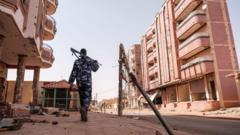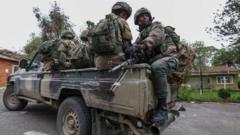Syrian rebels have successfully entered Damascus following President Bashar al-Assad’s reported flight, marking a dramatic turn in a civil war that has persisted for over a decade and claimed millions of lives.
Syria on the Brink: Rebel Forces Enter Damascus as Assad Reportedly Fled

Syria on the Brink: Rebel Forces Enter Damascus as Assad Reportedly Fled
A seismic shift in the Syrian conflict unfolds as rebel forces secure a foothold in the capital, and President Assad reportedly escapes.
In a surprising turn of events, Syrian rebel forces have taken control of Damascus, with reports indicating that President Bashar al-Assad has fled the capital following a difficult and tumultuous period of civil war. The offensive by the Hayat Tahrir al-Sham (HTS) came after a major push that had seen notable victories in Aleppo and along the highway leading to the capital. Prime Minister Mohammed al-Jalali has voiced his readiness to partner with any government chosen by the Syrian populace.
The Syrian civil war, ignited by a peaceful uprising against Assad in 2011, has escalated into a devastating conflict that has seen over half a million deaths and displaced 12 million people. Although the Syrian regime regained control over most urban centers with support from Russia and Iran, pockets of resistance persisted, particularly through Kurdish-led groups and HTS, which boasts a powerful presence in northwestern Syria.
Originating in 2012 as the al-Nusra Front, HTS evolved significantly over the years by distancing itself from al-Qaeda. However, major global powers continue to treat it as a terrorist organization. The latest offensive was strategically timed as the Syrian government, beset by corruption, sanctions, and the ongoing distraction of its allies from conflicts elsewhere, appeared vulnerable.
The situation in Aleppo began to shift dramatically the day HTS initiated its offensive. Quickly overwhelming government positions, rebel forces took control of Aleppo just days later. Assad's attempts to rally military support were undermined by losses suffered by his ally, Hezbollah, due to Israeli airstrikes. With chaos escalating around them, Assad's forces retreated, leading to the rebels declaring their aim to capture major cities such as Homs and the suburbs of Damascus.
On Sunday morning, HTS was jubilant in announcing their entry into the capital, even declaring the retreat of Assad, whose whereabouts remain unknown. The rebels proclaimed this moment as a historic turning point, freeing numerous detainees from the notorious Saydnaya prison, symbolic of oppression under Assad’s rule. Al-Jalali suggested readiness for collaborative governance in the aftermath.
Global leaders have responded with scrutiny; the White House is reportedly keeping a close watch on the developments, suggesting international ramifications could follow these shifts in power. The future of Syria now teeters on the cusp of potential transformation, as rebel factions assert control and challenge decades of autocratic governance.




















